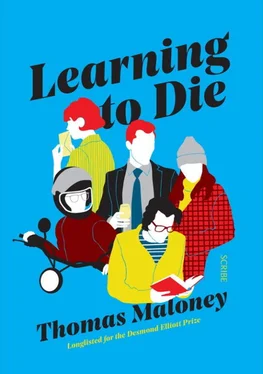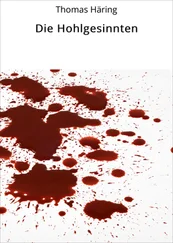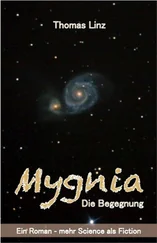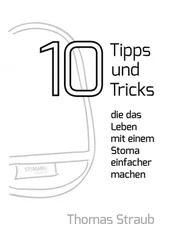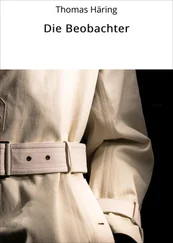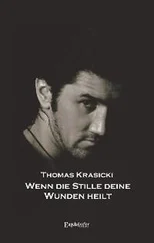‘Neither men nor their lives are measured by the ell.’
Montaigne
Dan Mock savours the near-silence: Nat has turned off the puffer, just for a few minutes, because it keeps making him cough — or try to cough. His puckered lungs, full of bad stuff, twitch their feeble, rapid breaths. It has occurred to him that this is a sort of trial run.
He pushes his sluggish, reluctant mind along one corridor of thought after another, looking for the old luminous clarity that seems to have deserted him. Life hangover. He could listen to a piece of music. Something delicate that rejoices in a soundless room; something heartbreaking, while he still has a heart to break. He turns his eyes to the screen and scans his collection, but can’t decide. Last chance for a last listen. No. It feels too late for that. Too late to worry about things he won’t do, places he won’t go, people he won’t see. His eyes swivel up to his Hubble galaxies. Uncounted thousands of them in that postage stamp of sky. Teeming with life — maybe. But the meaning, the vision is slipping now.
His family were here today. His parents would be here every day, of course, but he and Nat talked months ago, agreed to set gentle boundaries. He guiltily prefers to depend on her than on them. They all understand now that the end is near; don’t realise quite how near, perhaps, which is just as well. The atmosphere was serious but not grief-stricken. Nobody said much. Laura, his sister, surprised him by calmly recounting childhood memories. Little things: the time he ruined a birthday magic show; epic games of Monopoly and Scrabble; the prize stag beetle that escaped and found its way into her sock drawer. The past is a sock drawer. It was enough.
Two days later. Natalie Mock stands in the bathroom, but this time she’s not looking in the mirror. So this is it. The doctor switched Dan’s puffer to its more aggressive mode, not assisting but controlling. Said it had to stay like that now, said Dan would get used to it. He hates it. He can’t communicate distress even with his eyes, but she could tell. And now he’s drawn the line. Just like that. Refusal of treatment. She takes deep, slow breaths. If only she could breathe for him.
Mike, the GP and the nurse are in the kitchen, conferring in low voices. Dan asked them to wheel his bed into the front room, where his pictures are, and where slatted winter sunlight comes and goes.
Try not to fight me , he said last week, when the time comes .
Dan’s consciousness flees before the oppressive discomfort, the tyrannical machine assaulting his lungs, and finds itself in a strange, whimsical corner of his mind. The gnawings and scrabblings of panic, of what he’s leaving behind, of what he’s forgotten, of what he never knew — these persist but are muted, blunted by a mantle of something like relief.
Perhaps, he muses, my legacy, my achievement is to anoint the lives of my friends with a mortal essence. To teach them that there is no masterpiece, no transaction by which you can cheat death; you cannot run to the hills, and you cannot look to your children. A child is a genetic extension, yes, but surely in every sense that matters to our humanity, a child is not a continuation but something entirely new. My love, you see that now. Death has to be absolute to make life thrilling.
This death is a gift, my friends. Use it wisely.
The doctor has said all the things she’s obliged to say, and Natalie steps forward as the others respectfully make way and then melt out of the room. She looks into Dan’s moist, blinking eyes. The old mood diagnostics — tone of voice, movement or the subliminal semaphore of the face — so painstakingly tuned over the years of their marriage, are useless now, when she needs them most. Disconnected. Dan’s state of mind can be deduced only from the pauses before and between his answers. When the doctor asked him to confirm his decision, he didn’t hesitate.
‘Dan.’
Natalie. My love.
They sit for a while, his hand inert in hers except for a faint twitch of his thumb. His chest rises and falls at the puffer’s command. The doctor has tried to set a natural rhythm, but how could it be natural? At last, Natalie manages to say it.
‘Dan, do you remember Assisi?’ Now he does hesitate.
Yes.
‘Do you remember — the tiny little church where St. Francis died — with the vast Renaissance basilica built over it, like—’ she falters. Dan is selecting words with his eyes.
Like an architect’s delusion of grandeur.
She smiles.
‘Yes, like that. Like a fantasy. I was thinking of that place. That great, soaring palace of stone, built to honour one man who lived like a beggar, and died in a — a little shed, smaller than this room.’
Yes.
Natalie’s sobs are coming like shivers, but she keeps going. ‘Dan, I can’t build a palace like that for you. Not out of stone. But I promise I will love and honour you just as much — as much as any of them. I’ll build a palace for you, over you — inside — in my—’
In your thoughts. Yes. I know you will. A tear gathers in the outer corner of his eye, half-reclined as he is, then spills. Instinctively Natalie wipes it away.
‘I’ll build it, and I’ll sit in it and think of you — and us, and all these years we had.’
Yes. But Nat. Build it over me. Not over you. Do you understand me. She nods; cries. Build it with open doors. You’ll want to hear — he stops, looks at her, waits for a lull in the tears — those turtle doves — another long look.
She nods again, kisses his hand, his forehead, smells his hair. There is no need for a full stop.
Mike Vickers stands in a column of dread while the others make their arrangements. If you feel you could do it , Dan wrote last week, it will be a great mercy to Nat. She doesn’t really like the doctor, doesn’t want her to be the one. And she herself — no . The two friends discussed this once before, at the hospice. Conspirators.
‘Afterwards,’ wrote Mike, ‘and in the years to come, I will make sure Nat is alright.’
I know. I’m counting on you.
The doctor nods and Mike steps forward, looking at Dan, not at Natalie. Never at Natalie. Dan’s eyes follow him steadily, encouragingly. He reaches for the clips that secure the life-sustaining mask. Natalie sobs, but with restraint. As for Mike, he finds that he’s not going to cry. He’s going to do this — claim the last of his undeserved victories over his friend, the better man. He’s going to do this and not cry.
The morphine is weaving its sleepy spell. Dan can hear the distant music of Natalie’s voice, but not the words. He remembers — his body remembers — floating in a warm sea. Greece, perhaps. He was naked, the most naked he has ever felt, the sea a womb. Eyes closed, arms and legs gently paddling the void. And then, without warning: an eddy of cold water. A sharp, penetrating chill against which he had no defence. A moment only, before the uterine warmth flooded back.
That momentary chill was the chill of life. Up close, life is a magnum opus. But from a distance, it’s just a cold eddy, fleeting and unheralded, in a warm sea of nothing.
His mind finds time for one last observation. There will be no fear, after all: no reverent hush, no chill, no halls of alabaster white. Just a warm sea; a drowsy, forgetful womb of peace.
Dyspnoea . Beautiful, hypnotic word. Sad peony. Pansy ode. Open days. Soapy den. Easy pond.
‘…even on the greatest subjects too much can be said.’
Читать дальше
